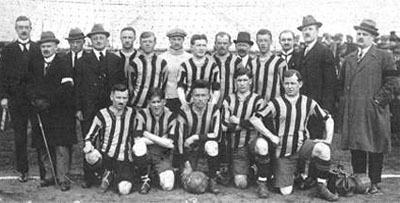Club Brugge KV
If you asked a random Belgian football fan which club he supports, the answer would most likely be Club Brugge KV. Other than their fans, the club is known for their three bear mascots and the striking blue-black home kits. They are also the second most decorated club in Belgian football, having won several Belgian Championship titles and Belgian Cups. The club was also one of the founding members of the Belgian first division (Coupe de championnat).
Basic facts
Founded: 1891
Country: Belgium
City: Bruges
Home grounds
Rattenplein (1891–1912)
Albert Dyserynck Stadium (1912–1974)
Jan Breydel Stadium (1975–)
Main trophies
Belgian First Division: 18
Belgian Cup: 11
Prominent players
Jan Ceulemans, Ivan Perišić, Daniel Amokachi, Hans Vanaken
Club records
Most games played: Dany Verlinden (570)
Top goalscorer: Jan Ceulemans (240)

Club Brugge line-up in 1920.
Photo: Beeldbank Brugge
History
The club was officially founded in 1891, under the name of Brugsche Football Club. However, numerous internal disagreements among the members led to a split within the club. Soon thereafter, 16 of the club's members formed a new entity called Football Club Brugeois (it should be clarified that "Brugsche" is Dutch and "Brugeois" is French, reflecting bilingual naming conventions in early Belgian football). It wasn't until 1897 that the two clubs reconciled their differences, merging into a single club. Around the same time, Bruges saw the forming of another football club called Cercle Brugge, which led to a fierce city rivalry.
In 1912, Club Brugge moved to a new stadium called "De Klokke", which they rented at the price of 1,960 francs per year. In 1920, Club Brugge won their first Belgian Championship. The same year, new president Albert Dyserinck bought the stadium, which proved to be the first step in transforming the club into a non-profit organization. When Dyserinck died in a car accident in 1931, the stadium's name was changed to Albert Dyserinck Stadium.
Rise to Power
The following four decades were relatively quiet for the Blauw-Zwart. Their next major trophy came in 1968, when they won their first Belgian Cup by defeating Beerschot after penalties. After changing their name to Club Brugge KV in 1972, the club won its second Belgian Championship the following season. Two years later, they moved to the Olympiastadion (later renamed the Jan Breydel Stadium), which remains their home to this day.
With their new stadium serving as the good luck charm, Club Brugge dominated the second half of the 70's. Under influential Austrian coach Ernst Happel, the club won three straight titles (1976, 1977, 1978) and one Belgian Cup (1977). On the international stage, they reached the European Cup final in 1978, where they were defeated by Liverpool. To this day, Club Brugge remains the only Belgian club to reach the final of the biggest football competition in Europe.
Modern Times
Despite Happel leaving the club in 1978, Club Brugge won another Belgian Championship two years later. However, they soon found themselves on the back foot, narrowly fighting off relegation in 1982. Still, the crisis didn't last too long; after reaching the semi-final of the UEFA Cup in 1988, the club followed it up by securing its seventh Belgian Championship. They continued to be a force in Belgian football throughout the 90's, winning an additional 4 titles and 3 Belgian Cups.
For most of the following two decades, the Blauw-Zwart played second fiddle to Anderlecht, which further soured the relations between these clubs. Soon enough, this became one of the most heated rivalries in Belgian football, earning the nickname "the Hate Game." During these trying times, Club Brugge managed to secure more Belgian Championships in 2003, 2005, 2016, 2018 and 2020 (the 2019–20 season was suspended due to the pandemic, with Club Brugge awarded the title).
Since 2006, Club Brugge has its own TV channel, becoming the first Belgian club to do so. Also worth mention is Club Brugge’s youth system, which has produced talents like Charles De Ketelaere and Lois Openda.
By Martin Wahl
Logo
 The logo consists of a circle with a crown on the top. Above this a star can be seen, symbolizes ten league titles.
The team colors can be seen in the middle of the circle diagonally, in striped fashion. In the surrounding circle black text is seen over white background with the name of the club. The initials KW stand for
Koninklijke Voetbalclub (in English: royal football club).
The logo consists of a circle with a crown on the top. Above this a star can be seen, symbolizes ten league titles.
The team colors can be seen in the middle of the circle diagonally, in striped fashion. In the surrounding circle black text is seen over white background with the name of the club. The initials KW stand for
Koninklijke Voetbalclub (in English: royal football club).
Club Brugge KV timeline
1891 The club is established as Brugsche Football Club.
1895 One of the founding members of the new Belgian football league.
1912 The club moves to a new stadium, "De Klokke".
1920 First time national league champions.
1968 Winning their first domestic cup title (Belgian Cup).
1972 The club is renamed to Club Brugge KV.
1976 First European cup final (UEFA Cup).
1975 The club moves to the Jan Breydel Stadium.
1992 First Champions League participation.
2000 Club YLA, Club Brugge's women's section is founded.
Trivia
Football clubs also founded in 1891:
› Football clubs ordered after establishment
Club nicknames:
Blauw-Zwart (Blue-Black)
External links
References:
https://en.wikipedia.org/wiki/Club_Brugge_KV
https://www.clubbrugge.be/en/history/history-tour